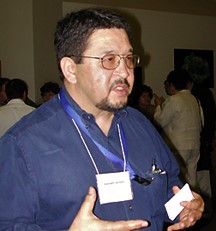Difference between revisions of "Ken Alibek"
(stub) |
m (monkeypox) |
||
| (One intermediate revision by the same user not shown) | |||
| Line 2: | Line 2: | ||
|wikipedia=https://en.wikipedia.org/wiki/Ken_Alibek | |wikipedia=https://en.wikipedia.org/wiki/Ken_Alibek | ||
|constitutes=Microbiologist,defector | |constitutes=Microbiologist,defector | ||
| − | |image= | + | |image=Alibek.jpg |
| − | |interests= | + | |interests=monkeypox |
|nationality=US | |nationality=US | ||
|nationality_at_birth=Soviet | |nationality_at_birth=Soviet | ||
| Line 19: | Line 19: | ||
|employment= | |employment= | ||
}} | }} | ||
| − | '''Kanatzhan "Kanat" Alibekov''', known as '''Kenneth "Ken" Alibek''' since [[1992]], is a Kazakh-American microbiologist, bioweaponeer, and biological warfare administrative | + | '''Kanatzhan "Kanat" Alibekov''', known as '''Kenneth "Ken" Alibek''' since [[1992]], is a Kazakh-American microbiologist, bioweaponeer, and biological warfare administrative manager. |
| + | In the early 2000s, his claims conveniently helped in U.S. decisions to spend billions of dollars on the [[military-industrial complex]] to "counter" [[anthrax]], [[smallpox]] and other potential bioterrorism agents. | ||
| + | |||
| + | ==Defector claims== | ||
| + | As a doctor of [[microbiology]], a physician and a colonel in the [[Red Army]], he helped lead the [[Soviet]] effort. He told U.S. intelligence agencies that the Soviets had devoted at least 30,000 scientists, working at dozens of sites, to develop [[bioweapons]], despite a 1972 international ban on such work.<ref name=latimes>https://www.latimes.com/archives/la-xpm-2007-jul-01-na-alibek1-story.html</ref> | ||
| + | |||
| + | He said that emigrating Russian scientists and others posed imminent threats. After the breakup of the [[Soviet Union]], he said, several specialists went to [[Iraq]] and [[North Korea]]. Both countries, he said, may have obtained [[anthrax ]]and [[smallpox]]. The transfer of smallpox would be especially ominous because the Russians, he said, had sought to [[genetically modify]] the [[virus]], posing lethal risk even to those who had been [[vaccinated]].<ref name=latimes/> | ||
| + | |||
| + | In 1998, Alibek said that there is concern that [[monkeypox]] could be engineered into a biological weapon.<ref>https://www.nonproliferation.org/wp-content/uploads/npr/alibek63.pdf</ref> | ||
{{SMWDocs}} | {{SMWDocs}} | ||
==References== | ==References== | ||
{{reflist}} | {{reflist}} | ||
{{stub}} | {{stub}} | ||
Latest revision as of 09:27, 17 December 2024
(Microbiologist, defector) | |
|---|---|
 | |
| Born | 1950 |
| Nationality | US (Born: Soviet) |
| Member of | Hadron |
| Interests | monkeypox |
Soviet biological warfare administrative management expert who defected to the United States. | |
Kanatzhan "Kanat" Alibekov, known as Kenneth "Ken" Alibek since 1992, is a Kazakh-American microbiologist, bioweaponeer, and biological warfare administrative manager.
In the early 2000s, his claims conveniently helped in U.S. decisions to spend billions of dollars on the military-industrial complex to "counter" anthrax, smallpox and other potential bioterrorism agents.
Defector claims
As a doctor of microbiology, a physician and a colonel in the Red Army, he helped lead the Soviet effort. He told U.S. intelligence agencies that the Soviets had devoted at least 30,000 scientists, working at dozens of sites, to develop bioweapons, despite a 1972 international ban on such work.[1]
He said that emigrating Russian scientists and others posed imminent threats. After the breakup of the Soviet Union, he said, several specialists went to Iraq and North Korea. Both countries, he said, may have obtained anthrax and smallpox. The transfer of smallpox would be especially ominous because the Russians, he said, had sought to genetically modify the virus, posing lethal risk even to those who had been vaccinated.[1]
In 1998, Alibek said that there is concern that monkeypox could be engineered into a biological weapon.[2]